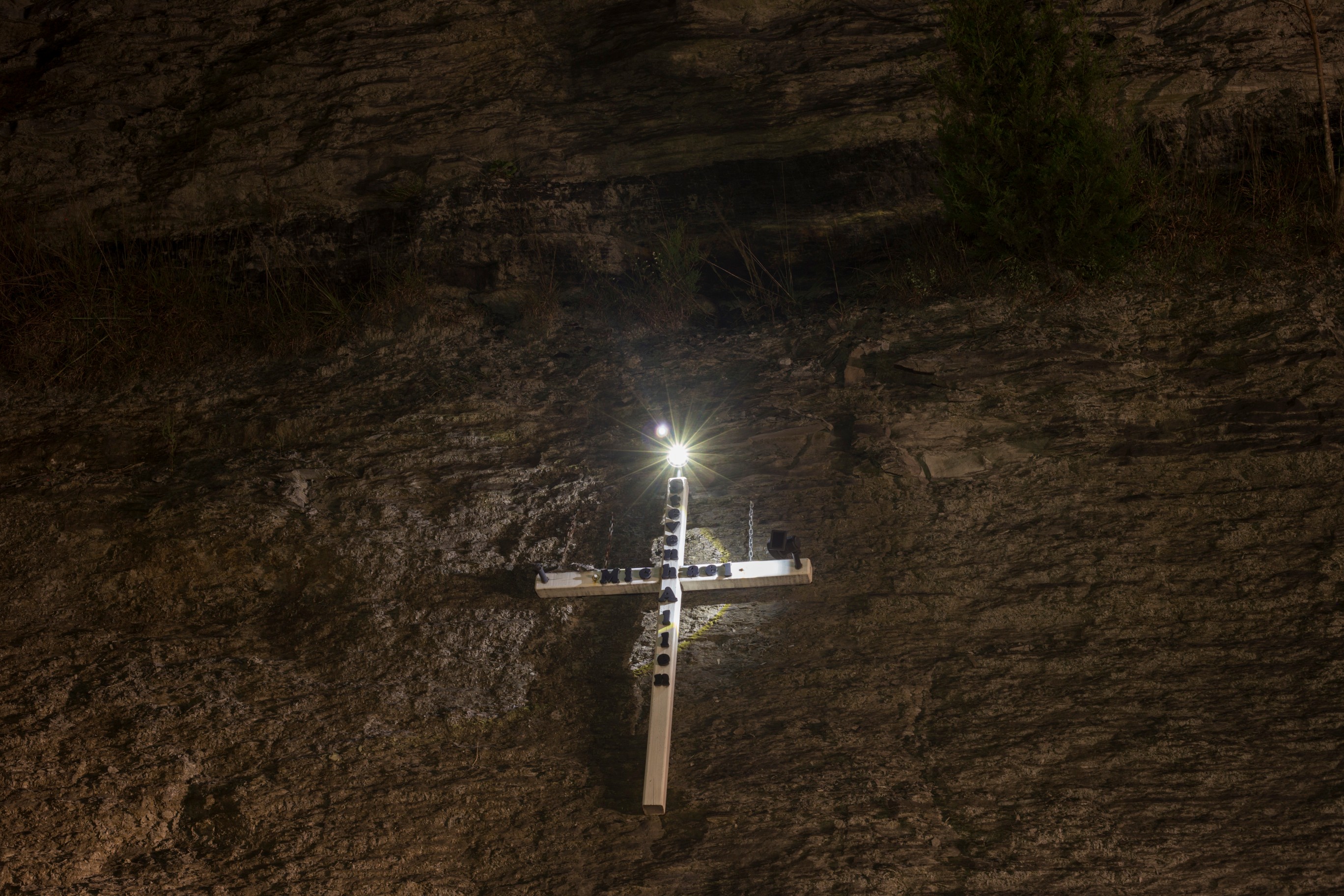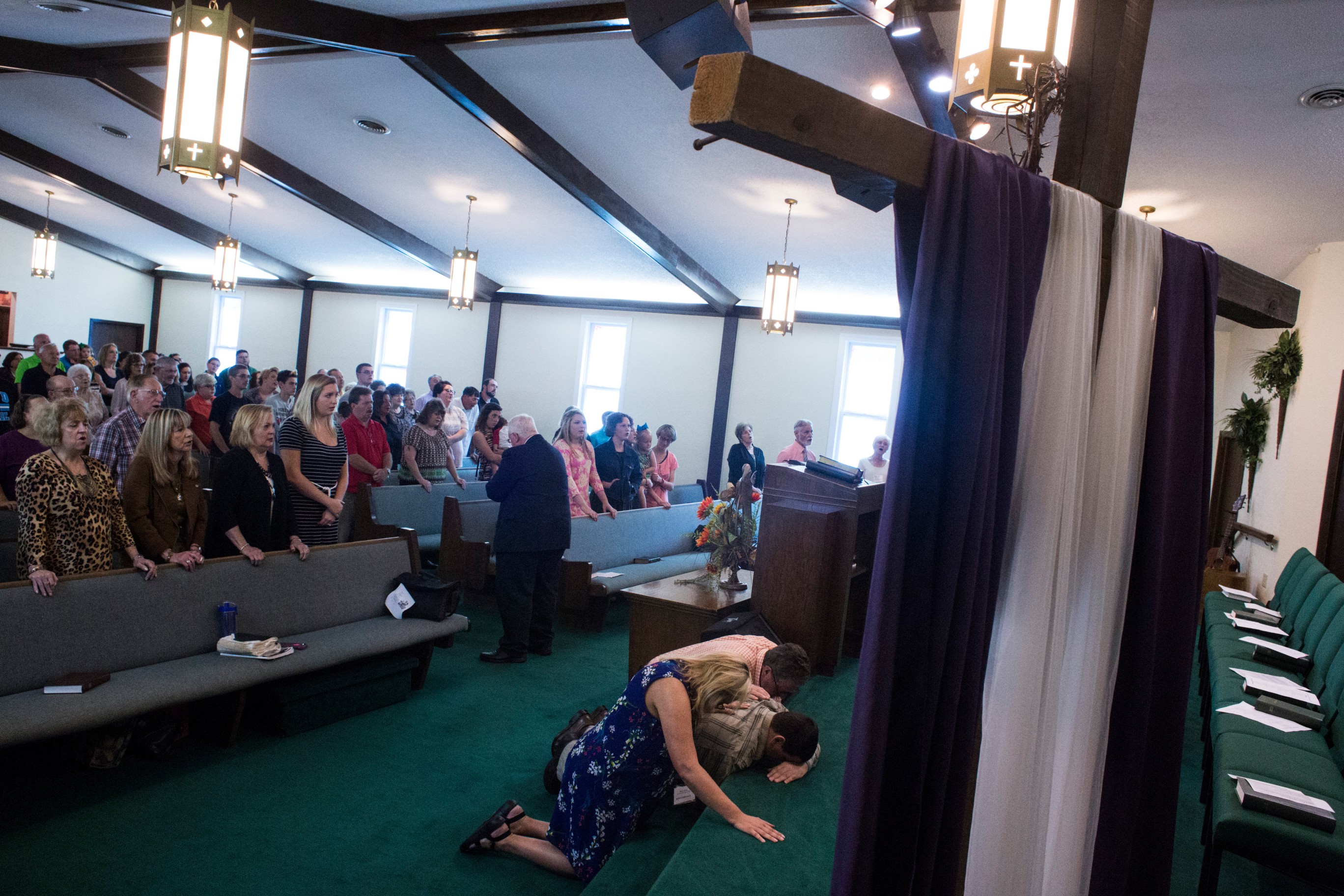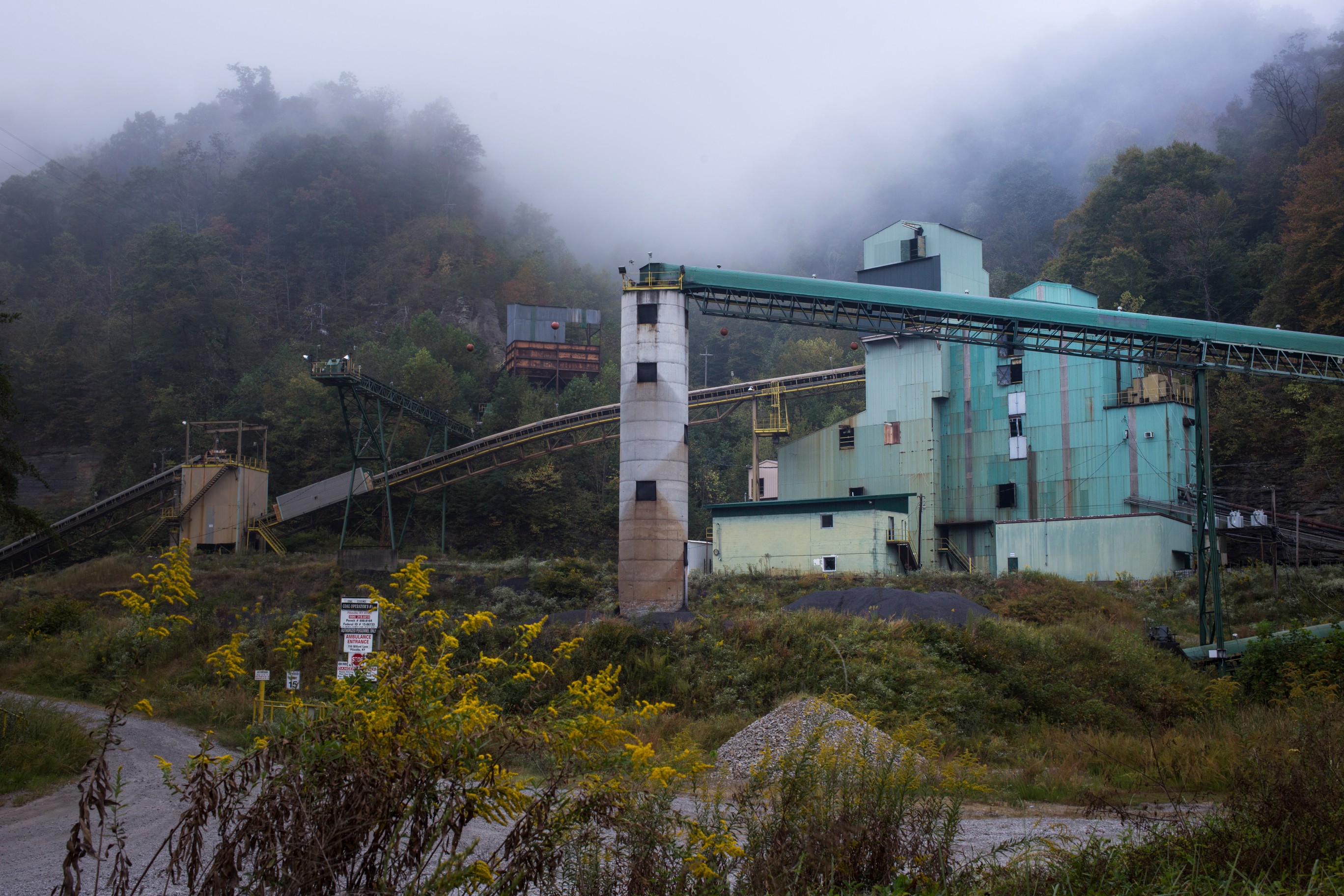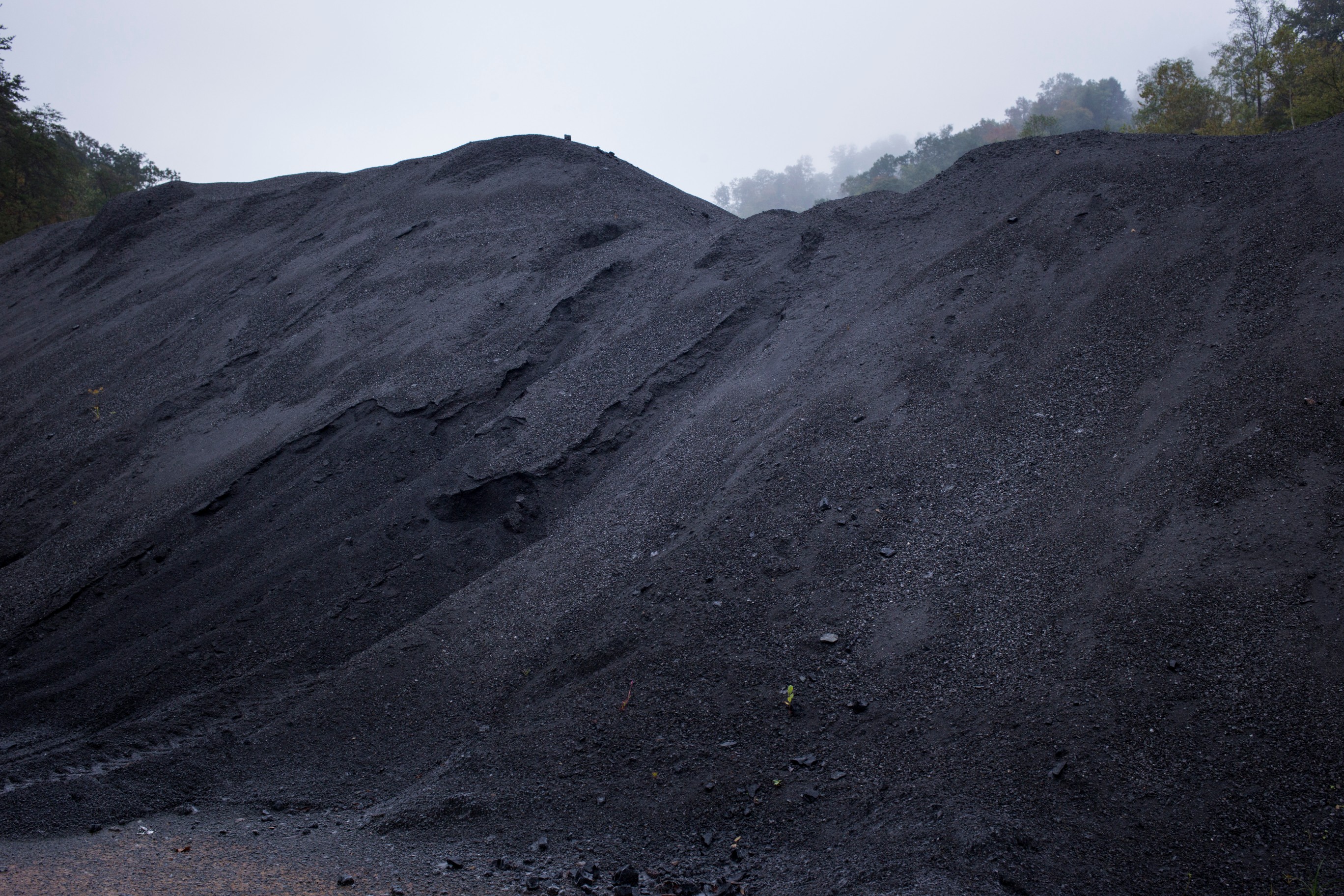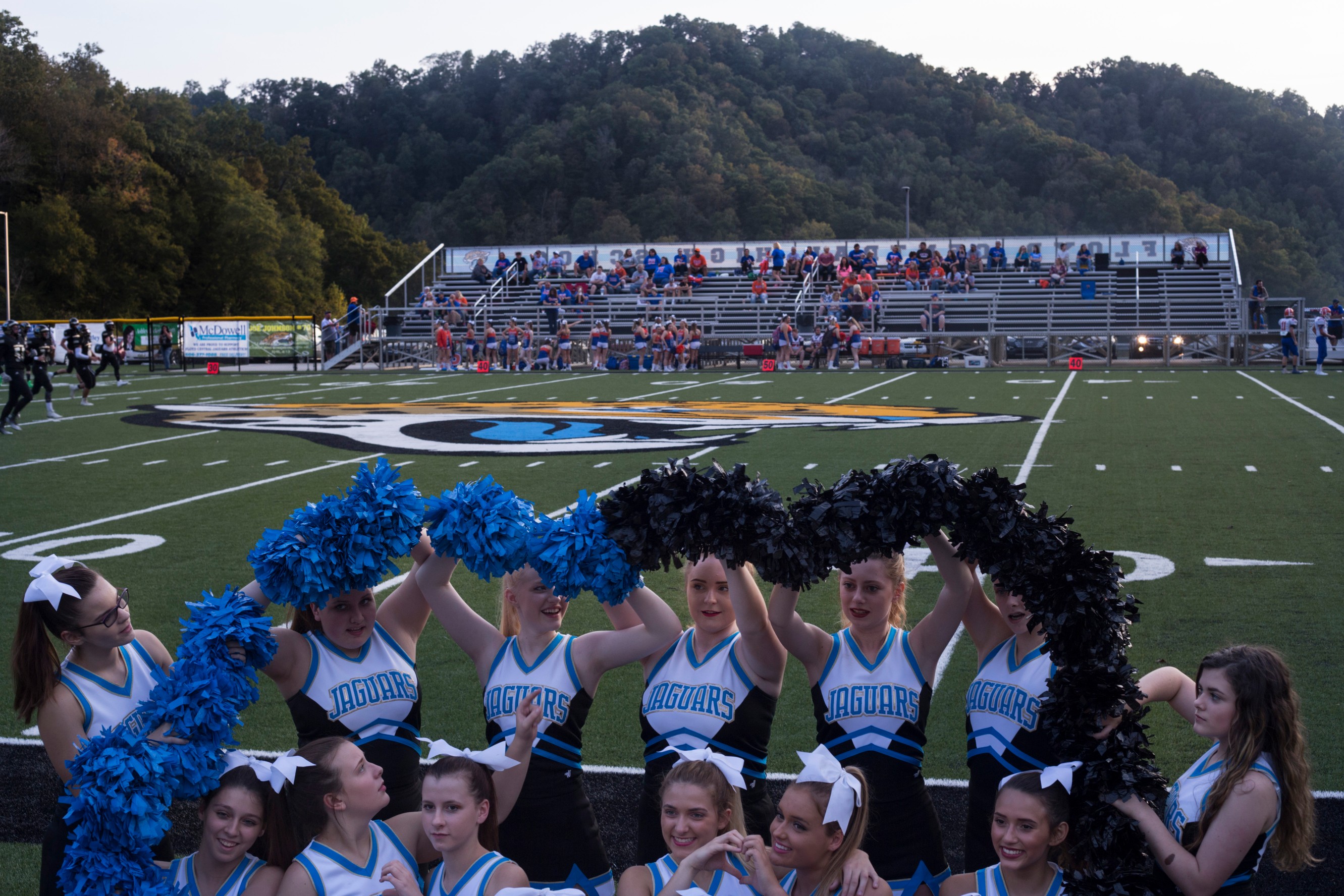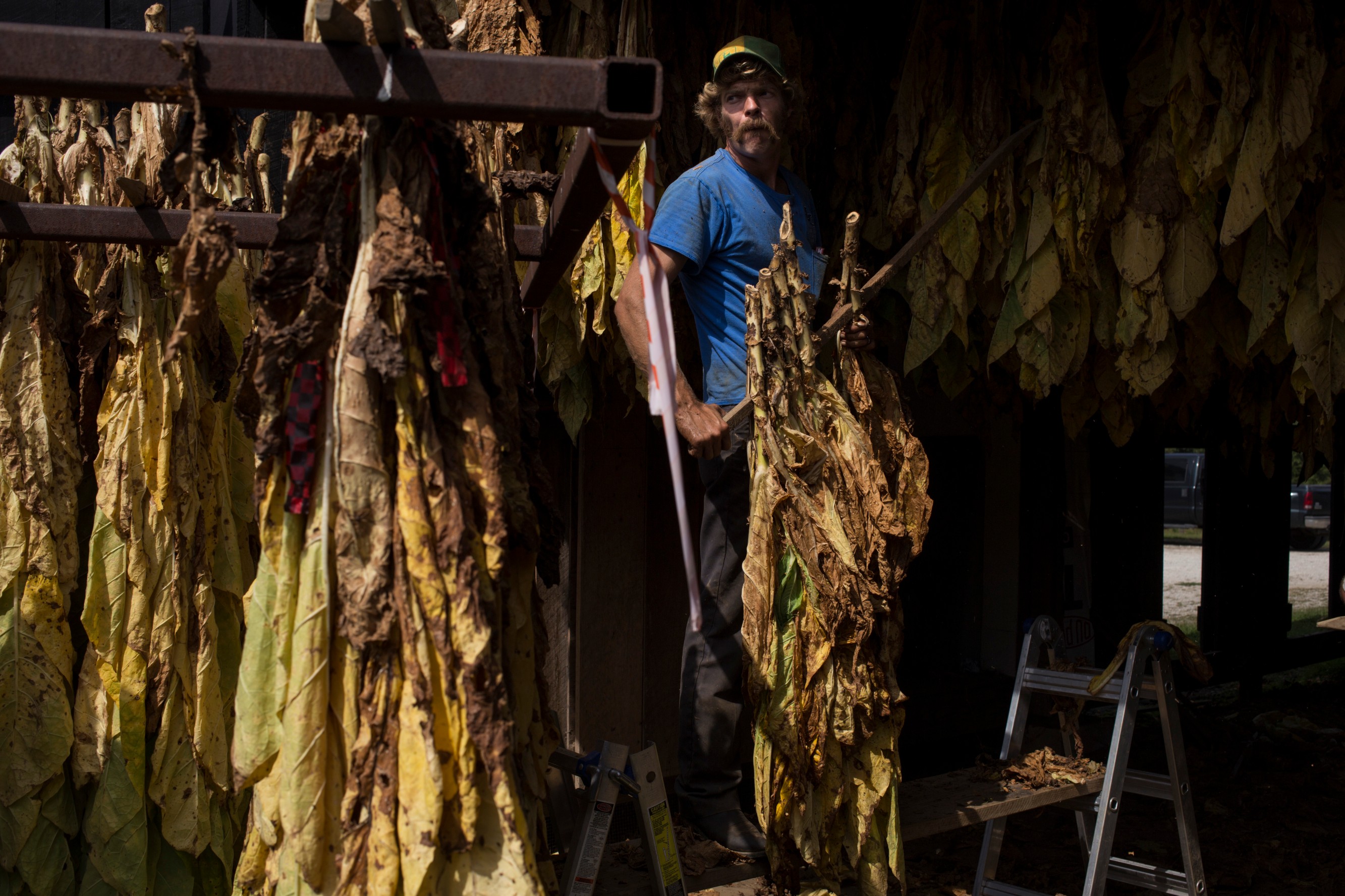Kentucky:
Introduction

In the heart of rural Appalachia, Eastern Kentuckians are trying to map out life after coal. The region has lost more than 9,000 coal-related jobs since 2010. In the second of five reports across the country, the Crossing the Divide team investigates the complex realities of these communities nestled amid the mountains, from a nascent digital revolution to worries over health care. Explore their reporting below, and follow their daily journey at xthedivide.org.
Kentucky:
An Appalachian Trail: Finding the Real McCoy
Down in the hollers along the Tug Fork of the Big Sandy River is a trail that winds along the Kentucky and West Virginia line and marks the most famous feud in American history.
And these days it feels like the two sides of the American political divide are as bitterly and intractably at odds as the Hatfields and McCoys, whose feud defined this place from 1863 to 1891 and still echoes as part of the identity here. So coming to this corner of rural Appalachia to do some listening and some reporting seemed fitting in this deeply divided and violent moment in America. Our trip here is part of our “Crossing the Divide” project, where we’ve been on a road trip in search of issues that divide us and stories that can unite us.
You can begin a journey into this reporting by seeing and hearing a portrait of the place by our photographer Brittany Greeson, who grew up in Kentucky, and our audio reporter Rachel Cramer. Together, they’ll take you inside a place that can be hard to navigate, but that we found welcoming once we arrived.
Like so many of the contemporary stories we’ve reported on here in rural Appalachia, we learned that the perception of the Hatfield-McCoy feud is more complicated than the reality. The perception that the feud, which lasted from 1863 to 1891 and saw 17 murders, was simply irrational hillbillies killing each other for no reason, can distort a real history, which was shaped by seams of economic inequity and political tension forged from the American Civil War, a battle for limited resources, land disputes and family honor that led to a cycle of revenge killing. So what do the modern descendants of the Hatfields and McCoys have to teach us?
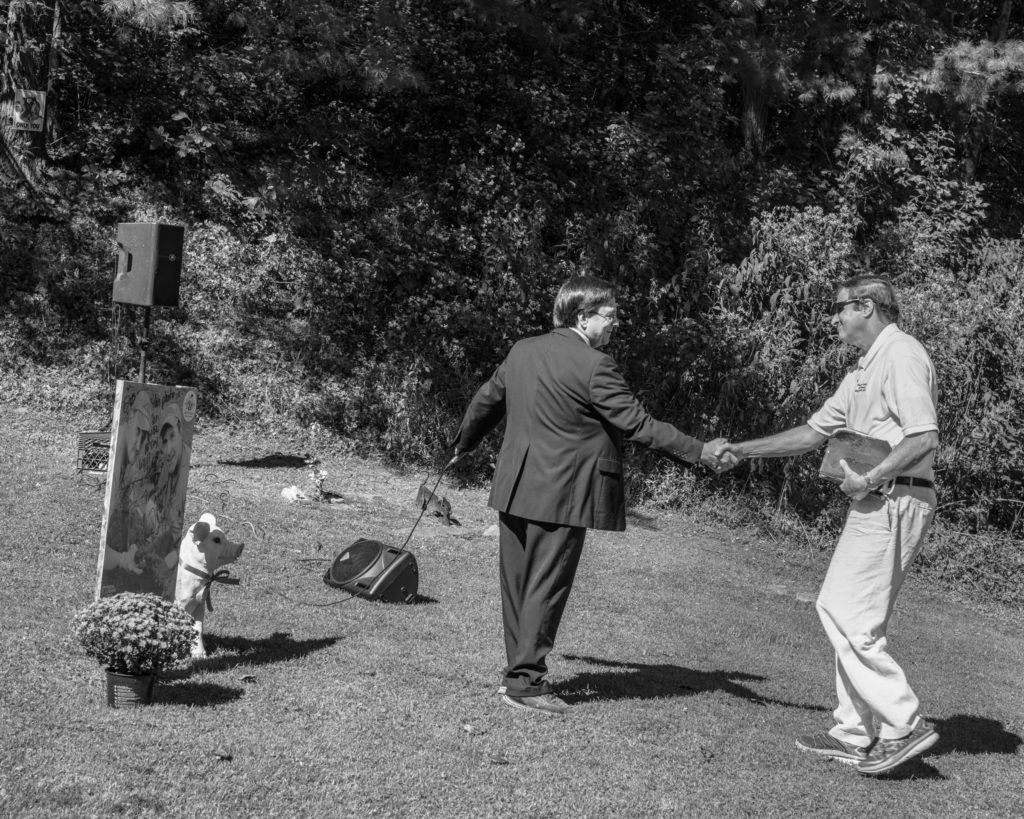
During two weeks of reporting centered around Pikeville, Kentucky, a small city of 6,000 set amid the coal mines of Eastern Kentucky, our reporting team explored the divide between the perception of Appalachia and the reality of the place. We traversed our way from a first impression of a distressed coal town in despair to the reality of a town where there is innovation in tech startups and a resiliency that runs deep among the people. We learned through the work of our writer Gabriel Sanchez that the battle for the future here might have more to do with access to broadband than lifting environmental regulations for coal.
We learned that a dysfunctional and divisive debate in Washington about how best to reform the Affordable Care Act signed by President Obama seems to overlook the urgency and the complexity of the issues faced by people in a region that voted overwhelmingly for Trump — who, of course, vowed to repeal the law. In the Mud Creek Clinic, we found local legend Eula Hall, 90, who has heroically provided care to Appalachia for three generations, and who spoke with eloquence and authority about the reality of Obamacare. At her clinic, our writer and data reporter Eric Bosco and our lead videographer Mahlia Posey captured the story of Eula and of the patients who were actually seeing benefits of Obamacare, while also hearing of its shortcomings.
Most of all we found people here who have not felt heard in the raging national debate and who are frustrated by decades of failed government programs that have done little to address acute health problems connected to poverty, hazardous work conditions and poor nutrition.
At every turn in our reporting we were finding people whose stories made all of the divisive politics of the moment much more complicated and nuanced than the partisan politics of Republicans and Democrats and more blended than the primary colors of red and blue. We’ve learned a lot navigating the divide between the perception of Appalachia and the reality.

And, as we learned, even the Hatfields and McCoys have found a way to forgive each other and to reconcile through the generations. In fact, the two clans drafted an official peace treaty in the aftermath of the attacks of September 11, 2001. The revenge killings had ended long ago, but 9/11 became a rallying point for the once-warring clans to illustrate the need for the whole country to pull together and be united after the attacks. Both sides of the long-resolved feud are now left wondering how the country has become so bitterly divided.
“It’s unbelievable how divided America has become 16 years after 9/11. Back then, we pulled together as one family. But now, we’ve really allowed ourselves to be pulled apart. We’re going to have to find a way to get back together as a country,” said Ron McCoy, a great-great-great-grandson of Randolph “Randall” McCoy, at a gathering at the McCoy family well, where the worst night of killing in the feud occurred in 1888.
Reo Hatfield stood alongside Ron McCoy at a gathering in September in Hardy, Kentucky, where members of both sides of the extended families held a moment of silence. They were clustered around the site of the McCoy family well, where one of the worst revenge attacks occurred in 1888, as part of an annual gathering that has become known as the Hatfield and McCoy Heritage Days. The cultural festival is part of a hopeful tourism sector that seeks to market the rich history of the place, even the bloody history of the feud.
Reo Hatfield, a great-great-great-great-grandson of the legendary William Anderson “Devil Anse” Hatfield, who is also a signatory to the peace agreement, said, “The key is forgiveness. We have to know how to do that.”
Hatfield, continued, “So if even the Hatfield and McCoys could find a way to forgive each other and to move on, then there has to be a way for America to get back together as one. We are made up of all countries, but we are one. And we are going to have to work together to solve the challenges we face.”
Seems America has a lot to learn from these latter-day ancestors of the Hatfields and McCoys.
Kentucky:
Photo Essay: Life after coal
My relationship with Kentucky has always been complex. It’s home but I’m not a native. I don’t romanticize it, but I defend its reputation. I have a flat midwestern accent, but identify as a Southerner. There’s wealth in the landscape, but I’ve met few people who were rich.
Over the years, there has been a bubbling resentment in Appalachia over how it is portrayed in photographs. Photos of dirty children and toothless seniors were like trophies for photographers to put in their portfolios, rather than an interpretation of the region. Other images exoticized the people, but lacked substance.
With this section of our reporting, my camera turned elsewhere, not to ignore the problems but to present complexities that many Kentuckians identify with. The photo essay sought to present the most honest representation of reality that it could, from someone who came of age in the region.
The focus of my photography easily pivoted to the story of life after coal. However, rather than highlighting how devastated these communities were, as we’ve seen time and time again, our team wanted to offer something different. We wanted to ask, “Yeah, but what else?”
The imagery for Kentucky comes down to a simple concept: It’s about relationships. It’s about relationships to the earth and how easily the mountains will humble a person. How religion has not only functioned as a driver of culture but a beacon of hope. How communities intertwine and how individuals are forced to fill the gaps when the rest of the country has failed them. It’s about a loss, but also a light in the near future. It’s about raising questions rather than having all the answers.
 A version of this story appeared in the Lexington Herald-Leader on October 8, 2017
A version of this story appeared in the Lexington Herald-Leader on October 8, 2017Kentucky:
Eastern Kentucky pivots toward the digital world

PIKEVILLE, Ky. – Silicon Valley, meet Appalachian Mountains.
In Eastern Kentucky, in the heart of rural Appalachia and amid the coal-dust remnants of the Industrial Revolution, a nascent digital revolution is taking shape. After the rapid decline of the coal industry, Eastern Kentuckians are attempting to diversify the region’s economy but limited access to broadband internet poses a significant challenge to their entry to the digital world.
Nestled in the mountains of Pikeville, in what was once a Coca-Cola bottling facility, is BitSource, a software development company where former coal-industry professionals design web pages, create software and develop augmented reality applications. The building, featuring an exterior studded with large black-and-white photos of soft drink production, was chosen partly because of its proximity to a fiber optic cable connection.
“We located there, along that pipeline, and got a connection that’s very expensive,” said Charles “Rusty” Justice, the co-owner of BitSource. “It’s still not enough. We don’t have adequate bandwidth there.”
Of the nearly 700,000 people without broadband access in Kentucky, 90 percent live in rural areas like Pike County, according to data from the Federal Communications Commission. This is because installing fiber optic cables carries expensive front-end costs. To earn profits, providers would either have to charge their few rural customers prohibitive rates or wait.
Despite the lack of access, some in Appalachia are attempting to enter the digital economy while diversifying the region’s professional opportunities after the loss of nearly 11,000 coal-related jobs since 2010, according to data from the Kentucky Energy and Environment Cabinet.
Justice, a Pikeville native whose family goes back four generations in the area, did not originally intend to work in software development. He holds degrees in mining and civil engineering, but after his excavation and engineering business was impacted by the decline in the coal industry, he sought other opportunities.
He co-founded BitSource in 2014, and nearly 1,000 people applied for the computer coding training the organization offered, Justice said. Ten were selected.
“The idea of a hillbilly from the coal industry doing high-tech work is counterintuitive,” said Justice. “But we’re working deliberately and intentionally to change search results for ‘Appalachia.’”
A statewide program called KentuckyWired intended to create a “middle mile” fiber optic cable network throughout the Commonwealth — like the one that drew BitSource to the bottling plant — is under construction. However it is not scheduled to be completed in Eastern Kentucky until 2020. The middle mile will run through more populated hubs like Pikeville, then the state anticipates that municipalities and private businesses will extend the connection from the hubs to the rural “last mile.”
So far, a fraction of the publicly-owned network has been built.
“In today’s world, high-speed broadband is just as essential as running water, telephone service and electricity in terms of attracting jobs and business to your particular location,” said former Kentucky Governor Steven Beshear.
“This is a much bigger issue than just a private telecommunications issue,” he said. “This is an issue about getting people back to work and taking obstacles out of the way so people have an opportunity to be successful.”
In spite of the lack of broadband connectivity, prominent West and East Coast entities took note of the potential growing in the mountains. In late September, Facebook co-founder Mark Zuckerberg visited nearby Hazard, Kentucky and met Appalachian computer science students. At the same time, a representative for the Massachusetts Institute of Technology visited Pikeville to meet with Justice.
“As a software engineer, I would say the people here are as good as you find in Silicon Valley,” said Jeff Freilich, associate director of alliances for Massachusetts Institute of Technology’s Computer Science and Artificial Intelligence Laboratory. “There is real potential here. What’s stifling it is the infrastructure.”

But coders are not the only people poised to gain opportunity through broadband.
At the University of Pikeville, the second U.S. institution of higher learning to offer athletic scholarships for eSports, 24 students are earning their degrees while professionally playing video games. One student, from neighboring Floyd County, received a full scholarship at the university to play League of Legends, a multiplayer online battle game.
“I’ve played on and off, then I was pretty much done playing it because I had to move and get a job,” said player and nursing major Brody Johnson. “I didn’t want to go back to school, because I couldn’t really afford it. Then, when [the coach] called me, it was like a whole ‘nother opportunity.”
Kelly Porter, the team’s interim head coach, explained that recruiting a player from Eastern Kentucky is often difficult.
“Kentucky is much more diverse than mountains and hillbillies,” Porter said. “This area is a little bit different, mostly because of the resources that they have. Internet is hard to come by, and that has widened the technology gap.” He also said that he likes to recruit from Eastern Kentucky when he can, because those players tend to be more invested in the local community.
“I guess [Porter] found it really rare that I was good at the game and from around here,” Johnson said. “Not many people who are from around here are good at the game at all.”
Johnson, in his professional capacity, said he benefitted from access to faster internet. “When I got upgraded internet, I jumped a whole division,” he said. “Almost a whole division and a half.”
Eastern Kentuckians are also increasingly telecommuting — where broadband is fast enough — through an organization called Teleworks USA. The organization trains people to work from home — generally in customer service positions — allowing those in remote areas with limited job opportunities to stay in Appalachia.
“It’s a rapid way to get people employed in the digital economy,” Teleworks director Michael Cornett said. “We could do much more if service were more widespread instead of just in these pockets of really good internet which are just here and there.”
In Eastern Kentucky, Teleworks has created about 1,000 jobs, according to data from a regional development program called Shaping our Appalachian Region. Before retraining workers, Teleworks asks that applicants print internet speed test results for their homes. If they don’t have sufficient access, prospective workers may lease space from the organization. However, some employers exclude anyone who can’t work from home, Cornett said.
“We can put people in our hubs, but that limits the opportunities we can place them in,” Cornett said. “We’re all holding our breath here. I mean, honestly! Broadband in this region, to me, is no different than utility service. It’s no different than water, and sewer, and electricity. In this economy, broadband is the thing that’s going to make you or break you in terms of expansion and joining this larger global economy.”
Asked about Eastern Kentucky’s entry into the global economy, former Governor Beshear said he thinks it’s only a matter of time.
“It will take some time for places like Silicon Valley to understand what’s going on here, but it will happen,” Beshear said. “In the end, Silicon Valley just wants whatever is good for them. If we can produce what’s good for them, be they people, goods or services, then they’ll take them.”
 A version of this story appeared in Lexington Herald-Leader on November 12, 2017
A version of this story appeared in Lexington Herald-Leader on November 12, 2017Kentucky:
In rural Kentucky, worries of losing Obamacare, despite flaws

WHITESBURG, Ky. — Lois Smith was paralyzed, but now she can walk again.
Smith, 62, had been to the emergency room off and on since she collapsed one day in her driveway about five years ago and found herself unable to walk. She was uninsured, on disability and incapable of paying a primary care doctor.
In 2013, she enrolled in Medicaid under the expansion created by the Affordable Care Act, also known as Obamacare, and has been seeing Dr. Van Breeding at Mountain Comprehensive Health Corporation in Whitesburg regularly ever since. Breeding determined she suffered nerve damage from diabetes. With treatment, Smith is now back on her feet.
“Since the Affordable Care Act, we’ve been able to see so many more patients, we’ve diagnosed high blood pressure, coronary diseases, diabetes, cancer,” said Breeding, referring to the act that President Barack Obama signed into law in 2010 without a single Republican vote.
The law expanded Medicaid and created regulatory changes in the individual market, providing health insurance for more than 20 million uninsured Americans and nearly half a million Kentuckians by 2016.
“These are people who may have died of these conditions but at least now have the ability to get a prognosis and get their conditions treated,” Breeding said.
This rural Appalachian clinic and its patients are far from the white hot debate about the future of the federal health law that roiled Washington in recent weeks. But it is here in Letcher County that any repeal or replacement of Obamacare would change lives. The reality on the ground — in a state that turned out in large numbers to vote Donald Trump into the White House — is that the Affordable Care Act has expanded services and provided critical coverage to uninsured citizens who might otherwise be dead today.

Kentucky’s Republican leaders, though, insist the health law is broken and must be replaced, even as health care workers offer a more nuanced critique.
“Obamacare is failing in Kentucky; it will bankrupt our budget,” Republican Party of Kentucky spokesman Tres Watson said Friday as he criticized a Democratic radio ad attacking U.S. Rep. Andy Barr, R-Lexington, for his support of Republican health bills. “Congressman Barr is offering Kentuckians a health care plan he can actually deliver to them rather than the unsustainable, failing pipe dream that is Obamacare.”
U.S. Sen. Rand Paul, R-Bowling Green, has been a longtime vocal advocate of repealing the Affordable Care Act but has yet to support any of the GOP’s recent health care bills. Those proposals keep too many of the taxes included in Obamacare and don’t cut enough of the spending, he has argued.
“The answer isn’t that we always want people on the government receiving end, we actually would like more people with great jobs, a thriving economy and private insurance,” Paul said during a recent visit in nearby Prestonsburg. “It’s complicated, it’s how do we get the economy to grow better and how do we fix the health care system at the same time? I think what we’ve got is not working very well.”
‘It just needs to be modified’
Those who’ve been fighting for decades to make health care accessible to the disadvantaged in Eastern Kentucky take a more no-nonsense approach to the health care debate. Eula Hall, who founded the Mud Creek Clinic in rural Floyd County in 1973, doesn’t dispute that Obamacare needs to be fixed, but she’s also adamant that stripping away the progress made in recent years would be a mistake.

“You know in any program you’ve got, there is always abuse you’ve got to look at,” said Hall, who will turn 90 this month and continues to work at the clinic that now bears her name. “It just needs to be modified.”
For Hall, access to affordable health care is a right that everyone deserves.
“People should have health care,” Hall said. “It shouldn’t be just one state here and there, it should be every state and everybody should be entitled to adequate affordable health care. … Nobody should have to be sick or nobody should have to do without their medication.”
Former Kentucky Governor Steve Beshear, a Democrat who expanded Medicaid eligibility in Kentucky under the Affordable Care Act in 2013, believes Republican efforts to repeal the law center on achieving a political “win.”
“For the folks in Congress, it is entirely a political game, it has nothing to do with providing people health care,” Beshear said.
“They have allowed the political game to become their priority, and as you can see from these ideas that they have been trotting out, every one of them rips health care away from millions of people and thousands of Kentuckians,” he said. “But they’re so wrapped up in politics and what they think their base wants that they’re willing to devastate a large portion of their population from a health care standpoint in order to ‘win’ on this issue.”
Republican proposals to replace the law have created a sense of unease about how much longer expanded Medicaid eligibility will last.
“It’s very stressful, for the doctors, the patients, everyone,” said Becky Amburgey, Mountain Comprehensive Care’s clinic administrator, who has worked at the clinic for 37 years. “After the Affordable Care Act, we were able to treat people that had never had insurance before, and if they repeal it, we don’t know if we’ll be able to get these people to their doctors.”

She added: “I worry, because if they lose coverage they go back to the same lifestyle they were living before and then they die.”
Sicker than most
At the forefront of the health care debate is this unarguable truth: Kentuckians are sicker than most Americans, especially in Eastern Kentucky. Cancer mortality rates nationwide declined about 20 percent from 1980 to 2014, but those rates increased in Eastern Kentucky, according to a 2017 study by the Journal of American Medicine Association. The study also showed Kentucky ranks 43rd among states in heart disease deaths.
Kentucky also leads the nation in cancer deaths, according to the American Cancer Society, and ranks 48th among states in drug overdoses, according to the U.S. Centers for Disease Control.
“Eastern Kentucky has the most challenging health indicators of any place in the entire nation,” said Ben Chandler, president and CEO of the Foundation for a Healthy Kentucky and a former Kentucky congressman. “Eastern Kentucky is not only behind the rest of Kentucky but it’s behind the rest of Appalachia.”
The federal health law has had a clear impact in getting Kentuckians access to care: 475,000 Kentuckians have enrolled in Medicaid under the expansion since 2013, according to the Kentucky Center for Economic Policy.
Before the Affordable Care Act, the Whitesburg clinic served 25,699 patients. By the end of 2016, it served 34,581 patients, according to clinic records. The percentage of uninsured patients dropped from 16 to 4 over that same period.
Dr. Breeding and clinic officials rave about their ability to offer better care to more people. Screenings for colon cancer have risen from 19 percent to 60 percent of patients, the clinic now offers dental and vision care, and they are planning to open a Suboxone clinic to help address the opioid crisis.

Obamacare has also had a “huge economic impact” by infusing upwards of $3 billion in medical expenditures into the state economy, according to Jason Bailey, founder and executive director of the liberal-leaning Kentucky Center for Economic Policy.
“It’s resulted in the direct creation of provider jobs, doctors, nurses, dentists, who all then go on to spend the money they make and put it right back into the local economy,” he said.
Cultural beliefs vs. health care
Breeding, a Whitesburg native, said he thinks many of his patients voted for Trump based on cultural issues, such as immigration, and promises of returning coal jobs.
“The patients didn’t look at the election as being a health care issue, although it was,” Breeding said. “They had this belief that closing our borders would make our country safer. That’s their cultural belief, and so they voted for President Trump.”
It’s also clear here that Obamacare has real problems. Health care experts note that premiums have risen sharply for individuals purchasing insurance on the federal health exchange. Rising premiums also squeeze small businesses, 60 percent of which support repealing the law, according to a February survey by BizBuySell, a small business marketplace.
Rather than repeal the law, some local health advocates would prefer making changes to stabilize the federal health exchange while protecting expanded Medicaid, which they see as crucial to the region’s economic recovery.
“The way out of the economic problem that we’re in as a state and a region and nation is a healthy, well-educated workforce,” said David Bolt, chief operating officer of the Kentucky Primary Care Association. “That’s not ideological thinking, that’s the very basis of how you grow an economy, how you grow jobs.”
Bolt thinks much of the talk about the failings of the health law is political bluster.
“The only part that is imploding at all is the individual market, a very, very small piece of the health care coverage,” Bolt said.
Meanwhile, Lois Smith and others who rely on expanded Medicaid wait anxiously to see what Washington does.
“I’m worried because you never know when they’re going to cut it off,” Smith said.
 A version of this story appeared in the Lexington Herald-Leader on October 8, 2017
A version of this story appeared in the Lexington Herald-Leader on October 8, 2017Kentucky:
Video Profile: Eula Hall and the Fight for Appalachian Healthcare
Eula Hall transformed health care in rural Kentucky by building the first — and only — medical clinic for low-income families. More than 40 years later, Hall, now 90-years-old, says the fight for community-based healthcare is as important as ever.
 A version of this story appeared in the Lexington Herald-Leader on January 3, 2018
A version of this story appeared in the Lexington Herald-Leader on January 3, 2018Kentucky:
Story in Sound: A Future in Hemp?
As the number of coal mining jobs continues to decline in central Appalachia, hemp is getting a lot of attention as one way to diversify Eastern Kentucky’s post-coal economy. But the region’s burgeoning hemp industry is also riddled with uncertainty. The lack of land suitable for growing hemp, and its association with marijuana pose some significant challenges.

Neil Spears is a resident of Pikeville, Kentucky. He’s one of the pioneers in Kentucky’s burgeoning hemp industry.
On a hot Friday afternoon in September, Spears drives off a paved road, through a creek, and up to his friend’s hemp farm near Pikeville. It’s nestled among the ancient mountains of Appalachia.
“I used to tell everyone in Colorado, they’d talk about the mountains in Colorado, well, you all got majestic mountains, we’ve got beautiful mountains. That’s two different things. Awe-inspiring and beautiful are two different things,” he says.
Spears has a goatee and hair that brushes his shoulders. He walks through the five-acre plot in his beat-up straw hat, watching out for rattlesnakes.
It’s not easy to see the hemp plants. Most of this year’s crop has been choked out by weeds.
“It’s not what I dreamed of,” Spears says as he walks through the field. “But first year out, you’ve got a crop up. Albeit a small crop, we’ve got a crop up.”
Spears grew up in Pikeville, pursued a career as a singer-songwriter, and eventually left to work in the marijuana industry in Colorado.
“A good friend of mine said, ‘Do you want to come home and get ready for what’s coming and start growing hemp?’ I said yeah. So came back last November and here we are.”
Hemp can be used for a wide range of products — plastics, health foods, biofuels. Spears and his friend plan on selling the fiber part of the crop to a processing facility in North Carolina later this fall.
But the most lucrative product is cannabidiol oil, or CBD oil. Spears is excited about their plan to build a 10,000 square-foot greenhouse to start growing hemp specifically for CBD oil.
CBD is different from THC, or tetrahydrocannabinol, the chemical in marijuana that gets you high. But some studies suggest it can be used to treat epilepsy, anxiety and depression. All these claims need more scientific research, but in the meantime, there’s a growing market for CBD oil.
“I’d like to see Eastern Kentucky to be a big grower of hemp, you know, as a whole. This is something that can start making some people some money. I’m interested in helping whoever in Eastern Kentucky wants to grow hemp, grow hemp,” Spears said.
But for hemp growers wanting to cash in on CBD oil, there’s risk involved. The hemp strains with the highest CBD levels also have higher levels of THC. And if the THC content is more than three-tenths of one percent, state law requires the grower to burn the crop.
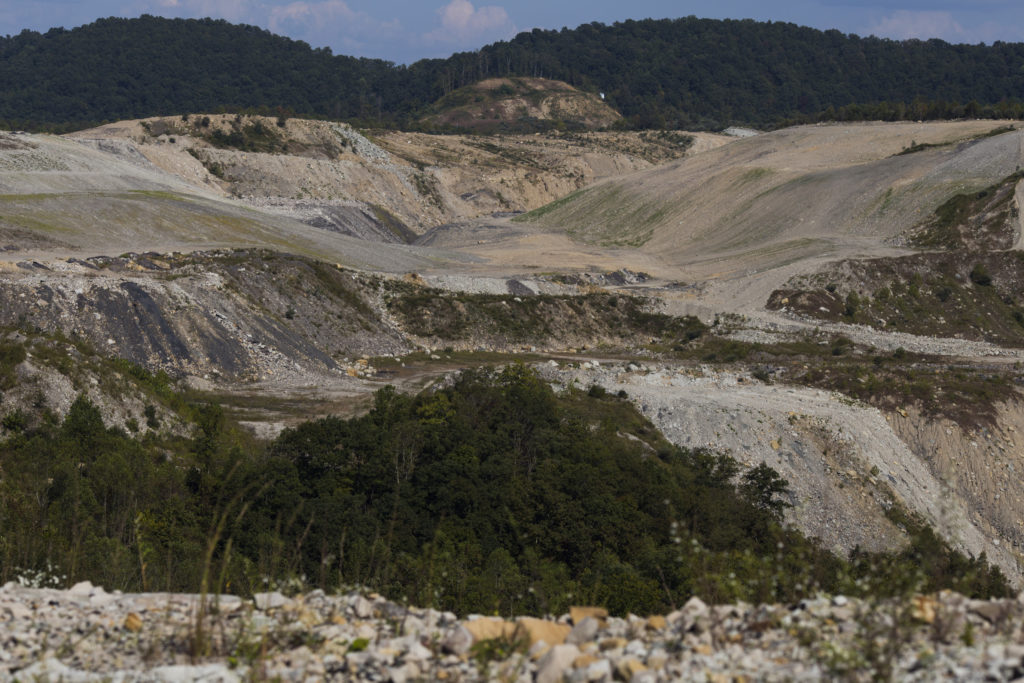
About an hour and a half away from Pikeville, in Jackson, researchers at the University of Kentucky are experimenting with creating hemp varieties more suitable for growing in the state.
University of Kentucky agronomist David Williams inspects one of his hemp research plots at the Robinson Center for Appalachian Resource Sustainability. The spindly, green stalks and the arrow-shaped leaves give off an earthy, slightly sweet smell.
“I don’t know how tall this plant is, but it was planted at the end of June. How tall would it be if it were planted 60 days earlier? We’ll find out next year,” Williams says as he examines a hemp plant. “The most important part about our work is determining which varieties are best adapted to our latitudes and our climate for optimum yields.”
This research would have been illegal a few years ago.
Hemp has a long history in the United States.
From the sails and rigging on the USS Constitution – America’s oldest naval ship – to the canvas on covered wagons heading out west, hemp is deeply tied to our nation’s past.
And Kentucky has played a vital role in that. While some was originally grown on small family farms, the majority of the nation’s hemp was produced in the Bluegrass Region of central Kentucky as a plantation crop.
“Hemp production is very tedious, very labor-intensive. One needs not look very deeply to understand that, that history is inextricably connected to slavery,” Williams said.
Hemp production in Kentucky dropped off after slavery was abolished and cheaper imported fibers became available. Except for a short-lived revival during World War II, hemp production was discouraged and finally banned because of its connection to marijuana.
Although CBD oil from hemp cannot get you high, it was still grouped in the same category as marijuana and heroin.
Then came the 2014 Farm Bill, which allowed certain states to grow hemp for the first time in about six decades. A number of Kentucky lawmakers said hemp would create thousands of jobs, and the Kentucky Department of Agriculture launched an aggressive research program.

“By most measures, Kentucky leads the nation in industrial hemp research,” said David Williams, the University of Kentucky agronomist. “The Kentucky Department of Agriculture has done a fantastic job managing what anyone would consider a very complex situation.”
And it is complex.
Those who want to grow or process hemp need a license from the Drug Enforcement Administration. And hemp seeds and plants cannot be taken across state lines.
Still, there were about 200 approved growers this year in Kentucky who – in total – planted almost 3,000 acres of industrial hemp. Some was for fiber, which includes everything from T-shirts to dashboards, but most of it was for CBD oil.
Almost all the hemp production was in central and western Kentucky, where the average farm is much larger — 100 acres or more. In the eastern, more mountainous side of the state, farms are smaller than 10 acres.
“We can’t expect Eastern Kentucky and West Virginia to become major contributors to hemp as a commodity crop,” Williams said. “That being said, plant breeding or certified seed production [create] situations where you don’t have to have hundreds of acres to be profitable.”
In other words, Williams says Eastern Kentucky doesn’t have the terrain to grow hemp for large-scale industrial products. But producers in the region could potentially grow hemp for the seeds or seedlings, and sell those to farmers in the central and western part of the state.
With limited flat land, some entrepreneurs thought former strip mines could become farms.
Nathan Hall is president of Reclaim Appalachia – a nonprofit working to develop economic opportunities on former coal mining land.
“Hemp has this reputation of being a hardy plant that grows just about anywhere … there’s a big difference between a plant that will technically grow anywhere versus a plant that you can get profitable production per acre anywhere based on the type of soils you’re working with,” Hall said.
He tried growing hemp on an old strip mine site, but it didn’t go well.
“There is no topsoil at all. You’re planting into rock,” he said.
Hall says despite the small size of farms in mountainous Eastern Kentucky, growing hemp for CBD oil in the fertile valleys could be economically viable … with a couple of caveats.
“We need to get clarity around the legal issues surrounding CBD; that still seems to be a bit undecided in terms of whether we can sell across state lines, with the current Administration where things like CBD might be deemed illegal at some point, there’s just a lot of uncertainty. There’s a lot of risk,” he said.
Despite those risks, Neal Spears from Pikeville is willing to bet on it.
“This is about helping people,” he said. “This is about making people better and making this region better.”
 A version of this story appeared on West Virginia Public Broadcasting on October 6, 2017
A version of this story appeared on West Virginia Public Broadcasting on October 6, 2017





